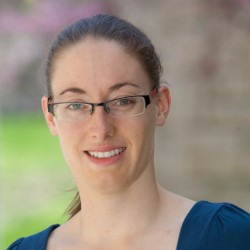 Dr. Michelle Paquette is an Assistant Research Professor in Physics and Astronomy and a Graduate Writing Advisory Committee member.
Dr. Michelle Paquette is an Assistant Research Professor in Physics and Astronomy and a Graduate Writing Advisory Committee member.
“As a core member of the GWAC, my role is to brainstorm, help implement, and evaluate initiatives to support graduate student writing at UMKC,” she said. “As a research faculty member in the sciences, whose primary role is mentoring graduate students, I hope to give a voice to those of us ‘in the trenches,’ and to emphasize the specific needs of students working in scientific or other fields engaged in technical writing.”
Michelle has led several versions of the “Writing for the Sciences” workshop.
“This is basically a crash course covering a range of topics: motivating your research, writing mechanics in technical writing, deconstructing a scientific paper, and the writing process,” she said. “Since the content could easily span a multi-week or semester-long course, I do not expect students to come away with a perfect handle on all of the information, but rather a perspective on the many different aspects involved in technical writing and some idea about what specifically they can work on to improve as a writer, along with a few concrete ‘rules of thumb’ that they can immediately put to use.”
While she does not have any upcoming workshops in the spring semester, Michelle has several workshops in consideration for the future, including one on preparing figures and graphs for publication and one on doing a literature search.
“Both of these will require some research on my part and/or collaboration with additional people since my scope of experience is limited relative to what is out there,” she said. “I would love more feedback from students about what they think would be of greatest value to them. I think the core Writing for the Sciences workshop will continue to be important, and it’s just a matter of fine tuning the content and delivery to make it the most useful it can be.”
A workshop Michelle is helping to organize in the spring is a writing panel covering topics like writing motivation and psychology, time management, and the writing process.
“I am really excited about this and think it will be a great resource for students and non-students alike—am hoping to see a big turn out!” she said.
Michelle said that writing skills are absolutely critical for professional scientists and for most professionals in general, academic or otherwise.
“As a graduate student, your success is largely dependent on the quality of your thesis/dissertation and additional publications,” she said. “Yes—these things rely on quality research, understanding, and ideas—but if you cannot communicate your results, you are not going to make it through. There is a saying common in academia, that if you don’t publish (or at least write up) your work, it might as well not exist, and there is a lot of truth to that. Moving forward into a professional career, in many cases writing becomes even more important, and a lack of writing skills will significantly limit your options.”
Michelle also said that writing is hard.
“Writing well is even harder, and often, people simply haven’t been taught how to write at the required level,” she said. “Additionally, while some people sincerely enjoy writing, many others do not or have a sort of love/hate relationship with it. Some people in the STEM fields in particular have chosen those fields in part because they sought to avoid writing. That means that many people must put in a lot of effort independently to become better at a craft that is both difficult and that they may or may not enjoy. However, it is important and ultimately worth it to put in this time—and hopefully as one improves, one will develop a deeper appreciation for the skill.”
Michelle encourages graduate students to take advantage of not just the workshops, but all of the resources available through the Graduate Writing Initiative.
“Writing can be such an isolating and, at times, discouraging or overwhelming experience,” she said. “These writing groups can help a student realize that they are not alone and provide solidarity/structure, in addition to opportunities for advice/feedback. Another great resource, which I think is underused, is the emeritus mentor program. This is an opportunity for students to work with someone with vast experience, and is a special opportunity to receive the one-on-one assistance that they may need.”
Michelle described some of her most memorable workshop moments.
“After one of my workshops, a student came up to me and told me that my workshop ‘inspired them to start writing their first paper,’” she said. “I have also been told by students that they had not realized that there was so much they didn’t know or realize about writing. As far as my workshops are concerned, that’s about all that I can ask for: although I do want to impart concrete information about writing, if I can motivate/inspire students to write and encourage them to strive to become better writers, I consider this a success.”
